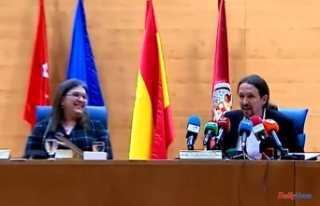After a new day of demonstrations in the twelfth week of mass protests against the judicial change plan and the dramatic warnings by Defense Minister Yoav Galant about its negative effects on national security if approved, Israeli Prime Minister Benjamin Netanyahu promised a reform "that satisfies both parties" but in the end it did not announce the brake on the controversial project. After deferring most bills to May, the legislation focuses on voting on the judge appointment committee change next week before parliament's recess.
In his most conciliatory message since Justice Minister Yariv Levin's January reform announcement, Netanyahu stressed the importance of "doing everything possible to defend the country against threats from abroad and an irreconcilable internal fracture."
"Opponents of reform are not traitors and supporters of reform are not fascists. The vast majority of Israelis across the political spectrum love our country and want to defend our democracy," Netanyahu said before going over the arguments of two sides increasingly at odds in the biggest crisis in recent years in Israel and reflected this Thursday in long hours of demonstrations, roadblocks and marches.
"Supporters of the reform think that what endangers democracy is an all-powerful Supreme Court that intervenes in all affairs and actually runs the country. Detractors think that what endangers democracy is a Knesset and a government that act without restraint and damage individual rights", he stated and promised that the reform must take into account "these two basic needs".
Minutes before his speech, Netanyahu met with Galant and managed to neutralize his intention to make a speech to warn Israelis of serious consequences for the country's security. Galant, who completed a long military career before joining politics, has received dozens of petitions from former army officials and reservists, including from his elite unit of the Navy, asking him to freeze the proposal. The fear of Galant and the head of the Army, Herzi Halevi, is that the approval of the plan will hit security, relations with the US and the army where more and more reservists announce that they will not appear "if laws that end democracy are approved ". The leaders of the protests denounce that Netanyahu "does not cease the legislation by preferring to maintain his government to security interests."
Netanyahu announced that he will personally intervene to resolve the crisis, denouncing that until now his hands were tied in reference to the agreement -due to his trial for corruption- in which he promised not to intervene in matters related to the selection of judges and the Supreme Court. Perhaps because hours before the Knesset approved a law that significantly limits the possibility of disqualifying the prime minister. He will now only be declared incapable if he announces it for reasons of physical or mental health or if 75% of the Government demand it. In such a case, the petition reaches Parliament where the vote of 80 of 120 deputies is necessary to disqualify him.
According to the criteria of The Trust Project












